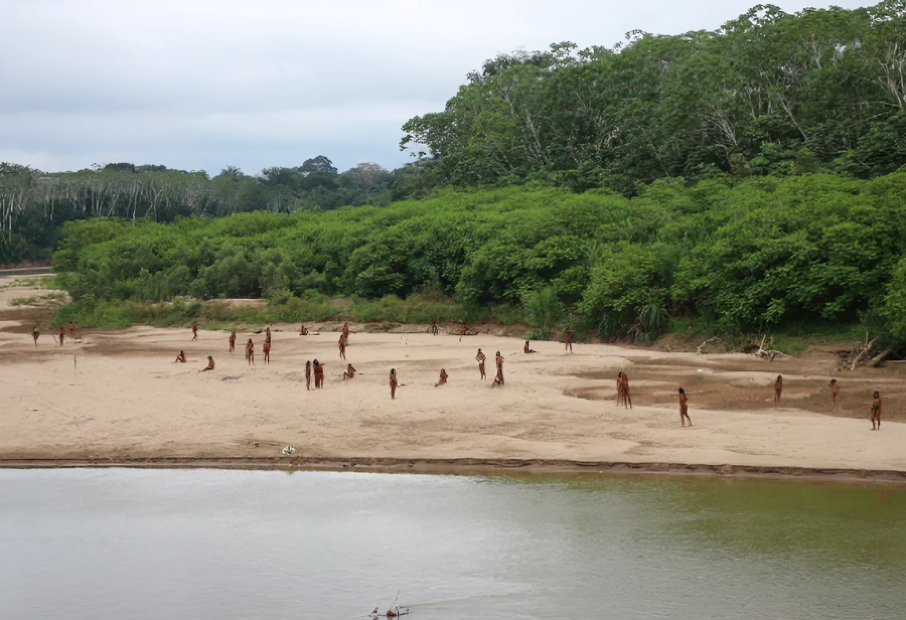- 17:30Morocco's Consumer Price Index Stabilizes as Core Inflation Climbs
- 17:15Bridging Economies: Quebec and Morocco Forge New Paths for Collaboration
- 17:00France-Morocco Relations Set to Deepen: Macron's Strategic State Visit Announced for Late October
- 16:40Dunedin Airport Implements Three-Minute Hug Limit to Enhance Traffic Flow
- 16:20Estonia Endorses Morocco's Autonomy Plan as Credible Solution for Sahara Region
- 16:00Bridging Cultures: A Celebration of Andalusian Heritage in Madrid
- 15:30Morocco Firmly Rejects UN Envoy's Partition Proposal for Sahara
- 15:24Star Power: How Celebrities Shape Voter Choices in the 2024 Presidential Election
- 14:45UN Envoy Signals Potential Shift in Sahara Mediation Efforts
Follow us on Facebook
Uncontacted Tribe's Plight Unveiled: Loggers Encroach on Mashco Piro's Sacred Grounds
In a rare glimpse into the world of one of the few remaining uncontacted indigenous tribes, haunting images of the Mashco Piro have surfaced, revealing their precarious existence amidst the relentless intrusion of logging companies in the remote Peruvian Amazon. Published on Tuesday by Survival International, a global movement dedicated to championing the rights of tribal peoples, these photographs capture the Mashco Piro on the banks of a river, alarmingly close to active logging concessions.
The reclusive tribe, known for their aversion to outside contact, has been sighted more frequently in recent weeks, venturing out of the rainforest in search of sustenance. According to local indigenous rights group FENAMAD, their movements suggest a desperate attempt to escape the encroaching presence of loggers in their ancestral homeland.
The Mashco Piro were photographed at the end of June, their figures etched against the backdrop of the Madre de Dios region in southeastern Peru, perilously close to the border with Brazil. Caroline Pearce, director of Survival International, sounded the alarm, stating, "These incredible images show that a large number of isolated Mashco Piro live just a few kilometers from where loggers are about to start their operations."
In a harrowing revelation, more than 50 members of the tribe have appeared in recent days near the Yine village of Monte Salvado, while another group of 17 surfaced near the neighboring village of Puerto Nuevo, according to the non-governmental organization (NGO) dedicated to defending indigenous rights.

The Mashco Piro, who inhabit an area nestled between two natural reserves in Madre de Dios, have historically shunned contact with the outside world, maintaining a guarded silence and minimal communication with the Yine or any other group, as attested by Survival International.
Several logging companies hold timber concessions within the territory inhabited by the Mashco Piro. One such company, Canales Tahuamanu, has carved out more than 200 kilometers (124 miles) of roads to facilitate timber extraction by logging trucks, a development that has raised grave concerns among indigenous rights advocates.
While a representative from Canales Tahuamanu in Lima failed to respond to a request for comment, the company is reportedly certified by the Forest Stewardship Council, with 53,000 hectares (131,000 acres) of forests in Madre de Dios designated for the extraction of cedar and mahogany.
On June 28, the Peruvian government acknowledged reports from local residents of Mashco Piro sightings along the Las Piedras river, a mere 150 kilometers (93 miles) from Puerto Maldonado, the capital of Madre de Dios.
However, the plight of the Mashco Piro extends beyond Peru's borders. Rosa Padilha, a representative of the Brazilian Catholic bishops' Indigenous Missionary Council in the state of Acre, confirmed sightings of the tribe across the border in Brazil. "They flee from loggers on the Peruvian side," she lamented, adding that during this time of year, the tribe appears on beaches to collect tracajá (Amazon turtle) eggs, leaving behind footprints and discarded turtle shells.
Padilha's poignant observation encapsulates the dire circumstances faced by the Mashco Piro: "They are a people with no peace, restless because they are always on the run."
As these haunting images bear witness, the Mashco Piro's existence hangs precariously in the balance, their sacred grounds violated by the insatiable demand for timber, forcing them to flee their homeland in a desperate bid for survival. The world watches with bated breath, hoping that these glimpses will serve as a rallying cry to protect the rights and preserve the sacred traditions of one of the few remaining uncontacted tribes on Earth.



